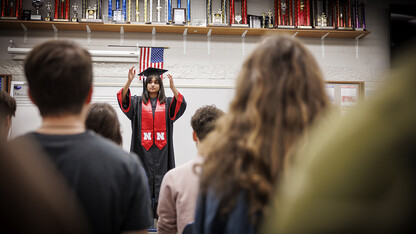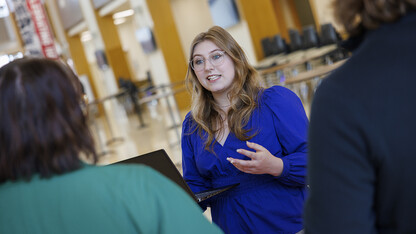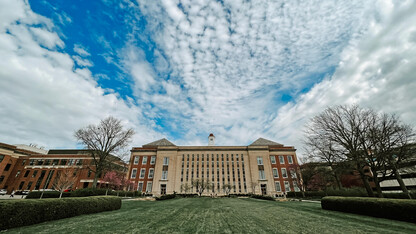· 4 min read
Smith left lasting impact on students, university

Editor’s Note — As part of Women’s History Month, Nebraska Today is featuring female Huskers — from the past to current day — who have made or are making impacts on campus. Today, we’re featuring Ellen Smith, who helped lead the classics department as Dear Old Nebraska U’s first woman faculty member and became a much beloved (and sometimes feared) registrar.
Hired in 1877, Ellen Smith was the first woman faculty member at the University of Nebraska.
Born Feb. 14, 1838 in Orwell, Ohio, Smith was educated at Orwell Academy, earning the equivalent of a high school education. Immediately after graduating at the age of 14, Smith began teaching.
When she reached her late 20s, Smith used her savings and enrolled at Hillsdale College in Michigan. Her funds were limited, so she started to clean houses, including that of the college president Edmund Fairfield.
After graduating from Hillsdale in 1866, Smith became assistant principal of a school in Mansfield, Ohio.
Fairfield went on to become the chancellor at NU. In 1876, he sought out Smith and invited her to visit Lincoln. The following year she began teaching Greek and Latin at NU with an annual salary of $100 a year.
Smith rose to become the head of the NU Latin School, professor of Latin, custodian of the library and finally registrar — a post she held from 1884 to 1902.
When she moved to Lincoln, Smith bought a small, white frame cottage at 1204 U St., near the modern site for Bessey Hall. Known as “Ma Smith” or “Aunt Ellen” on campus, Smith rented rooms to women students, who found her a delightful, yet strict, host.
As registrar, she personally met — and reportedly — intimidated every student.
In an article in the Courier, an independent student newspaper, Smith was quoted telling one student, “No, you can’t find out how many credits you have until you get your pass book. Just get your lessons. I am paid to keep your records.”
Known to work 12 to 15 hours a day, Smith was not entirely impressed with one student carrying 18 credit hours in a semester.
“Very well done,” Smith said in the Courier article. “You carried 18 hours very satisfactorily last semester. Try it again.”
In spite of this loving terrorism, or perhaps because of it, Smith won the hearts of faculty and students.
Roscoe Pound, one of Smith’s students and later dean of the Harvard Law School, said of Smith, “So far as she could, she saw to it that all took with them from the university habits of earnest and laborious preparation and a settled disposition to do their best work.”
In August 1902, Smith resigned as registrar due to failing health. Six months later, in 1903, she died at the age of 65. Memorial services were April 24, 1903 in Memorial Hall. Read about the reaction to her death here.
A house built in 1888 by Frank L. Sheldon, founder of the Lincoln Street Railway Co., was purchased by the university in 1920. The building, which was located immediately south of Canfield Administration Building, was purchased to provide office space for Amanda Heppner, dean of women.
Known first as the Women’s Building, it was later named Ellen Smith Hall at the suggestion of the Association of Collegiate Alumnae. In 1958, the building was razed to provide a grassy area south of the administration building.
Today, Smith Hall, a residence hall, carries the name of Ellen Smith.








